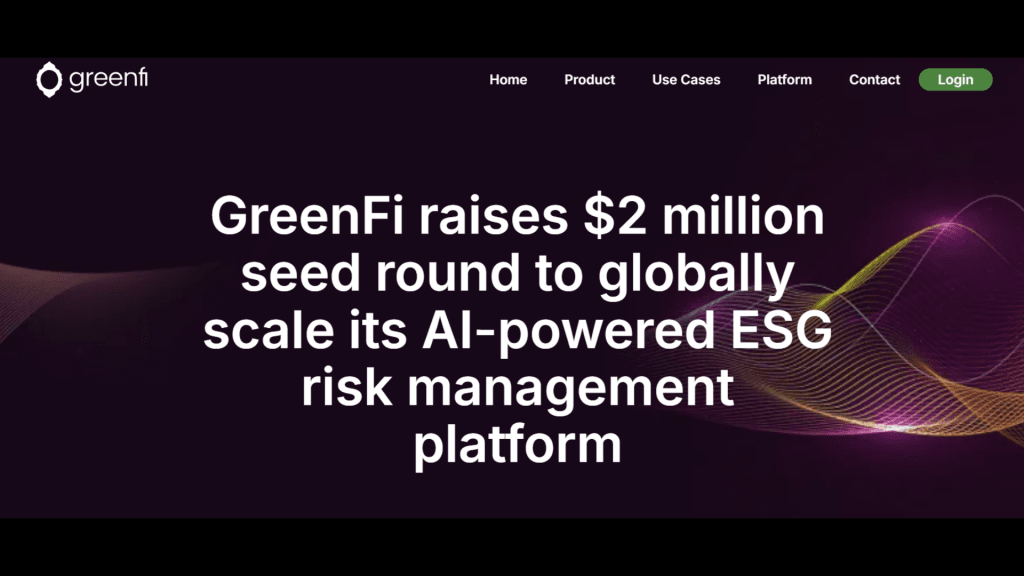GreenFi Secures $2M to Scale AI-Driven ESG Risk Platform Across Global Financial Markets

• $2 million seed round backs expansion of AI-powered ESG risk management across banks, asset managers, and corporates.
• Early deployments with major financial institutions show material efficiency gains, including 38% cost reductions in ESG management.
• Funding accelerates GreenFi’s entry into California, Europe, Southeast Asia, and the Middle East as regulatory scrutiny intensifies.
GreenFi has raised $2 million in seed financing to accelerate the global rollout of its AI-driven ESG risk and compliance platform, advancing a wave of digital transformation underway across financial institutions facing rising regulatory pressure. The round was led by Transition VC with participation from senior banking executives in Singapore and the Middle East, channeling early-stage capital into a technology now gaining traction in complex, multi-jurisdictional ESG workflows.
AI Steps Into the Centre of ESG Risk Management
Founded in 2023, GreenFi applies artificial intelligence and large language models to ESG due diligence, sustainability reporting, and portfolio-level risk assessment. The platform is designed to replace manual and fragmented processes that have long slowed ESG integration, especially within banking, where emissions reporting, environmental questionnaires, and supply-chain assessments often span thousands of counterparties.
Financial institutions using the system report material gains. One bank working with GreenFi cut the cost of ESG management by 38 percent through automated emissions reporting and real-time data analytics. Another international lender has digitised environmental risk reviews and ESG reporting for over 50,000 commercial banking clients across 19 countries. The same architecture is now supporting the Kerala Infrastructure Investment Fund Board as it reports on its green bonds.
These case studies highlight the governance pressures facing regulated entities, particularly as disclosure frameworks tighten across the EU, US, and Asian financial hubs. Automation is becoming less about convenience and more about risk containment.
Growing Client Base Across Global Markets
GreenFi’s customer footprint spans Singapore, India, Europe, and the US. In Singapore, the platform is being deployed within United Overseas Bank and its subsidiaries to automate emissions disclosures across diverse asset portfolios. In India, renewable energy developer Wattsun Energy uses GreenFi to produce ESG reports and measure impact for more than 7,000 end users.
Founder Barun Chandran describes the company’s approach as building “AI agents designed specifically for sustainability teams,” enabling auditors, credit officers, and compliance units to work from verified datasets instead of piecing together information from multiple systems. The intention is to let teams focus on strategic risk evaluation rather than administrative processing.

RELATED ARTICLE: Mirova Energy Transition Fund Reaches $1.3B in Second Close as Investor Demand Grows
Positioning Within Climate-Fintech Accelerators
GreenFi’s selection into programs including the UN Climate Tech Accelerator, G20 TechSprint Brazil, the RBIH Frictionless Finance Accelerator, and UOB FinLab GreenTech Accelerator reflects a convergence of interest from climate-policy institutions and banking regulators. These initiatives are pushing for verifiable, decision-useful ESG data capable of supporting sustainable finance commitments and emerging taxonomies.
Kerala Startup Mission CEO Anoop Ambika said Kerala’s recently approved state-level ESG policy is creating new demand for digital compliance tools. He noted that KIIFB’s adoption of GreenFi sits within a broader government push to standardise climate-related reporting across public entities.
Transition VC managing partner Mohammed Shoeb Ali said GreenFi’s value lies in enabling financial institutions “to monitor, assess, and underwrite their customers more intelligently” as ESG risks begin to influence credit decisions and portfolio valuations.
What Executives Should Track
The investment arrives as the global ESG software market surpasses $5 billion and prepares for additional regulatory tightening. For banks and corporates, the growing complexity of disclosures — from financed-emissions reporting to nature-related risk assessments — is shifting ESG from a corporate-affairs function to a quantifiable risk domain. Automated audit trails, machine-readable data, and verifiable workflows are becoming operational requirements.
Looking Ahead
With the new capital, GreenFi will deepen its AI research, expand its sustainability intelligence engine, and strengthen partnerships as it moves into California, Europe, Southeast Asia, and Middle Eastern markets. Its trajectory reflects a broader shift: as compliance obligations rise, technology that can lower cost, reduce exposure, and support sustainable capital allocation is rapidly becoming essential infrastructure for global finance.
GreenFi’s next phase will test whether AI-enabled ESG risk tools can scale at the pace regulators now expect. For financial institutions navigating climate-related disclosures and transition-finance commitments, the company’s platform enters the market at a strategically consequential time.
Follow ESG News on LinkedIn












